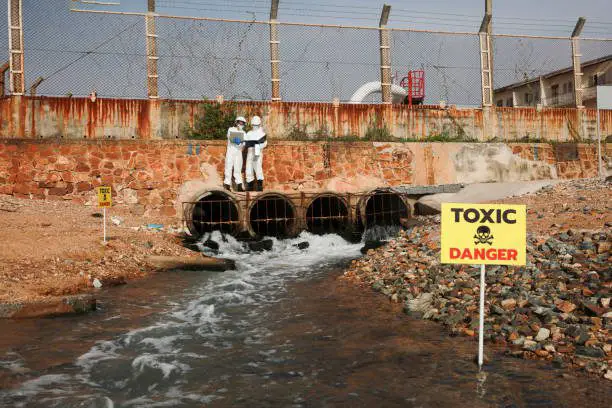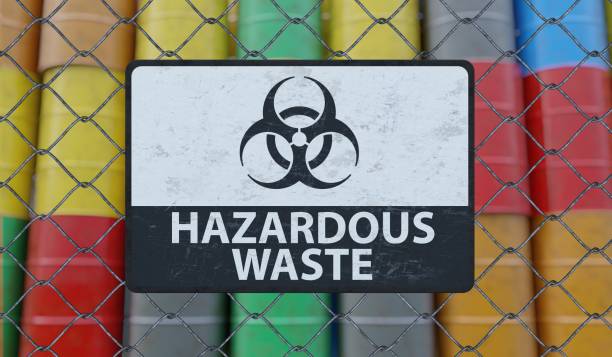Ways To Generate Income From Hazardous Waste
Hazardous waste refers to any type of waste material that has the potential to cause harm to human health, the environment, or both. This type of waste is often generated as a byproduct of industrial processes, such as manufacturing, construction, and chemical production.
Hazardous waste can come in many different forms, including liquids, gases, solids, and sludges. Some common examples of hazardous waste include batteries, pesticides, medical waste, radioactive waste, and electronic waste.
The danger posed by hazardous waste is due to its potential to release toxic chemicals and pollutants into the environment. These chemicals can contaminate soil, water, and air, leading to serious health problems for humans and wildlife. In addition, hazardous waste can also cause damage to ecosystems and disrupt natural habitats.
To minimize the risk associated with hazardous waste, governments and organizations around the world have established regulations and guidelines for its handling, storage, and disposal.
These regulations often require that hazardous waste be treated and disposed of in specific ways to prevent harm to people and the environment. Hazardous waste is a serious issue that requires careful attention and management to prevent harm to people and the planet.

It’s important to note that hazardous waste is a complex and often regulated area, and proper disposal or treatment is crucial for safety and environmental protection. However, here are some ways hazardous waste can generate income:
(1) Recycling
Hazardous waste can contain valuable materials such as metals, plastics, or chemicals that can be recycled or reused. Some companies specialize in extracting these materials from hazardous waste and reselling them for profit.
Recycling hazardous waste can be a profitable business, but it requires careful planning, specialized knowledge, and compliance with regulatory requirements.
The income from recycling hazardous waste depends on several factors, including the types and quantities of waste materials, the recycling process used, the market demand for recycled materials, and the cost of operations.
In general, hazardous waste materials that have high market value, such as precious metals and rare earth elements, can generate significant income from recycling. Other hazardous waste materials, such as batteries, electronic waste, and certain chemicals, may also have value if recycled properly.
However, the cost of recycling hazardous waste can be high due to the need for specialized equipment, handling and storage requirements, transportation costs, and compliance with regulatory requirements. Moreover, the income from recycling hazardous waste can be volatile and subject to market fluctuations, which can impact profitability.
While recycling hazardous waste can generate income, it is important to consider the potential costs and risks involved before starting a business in this area. It is also crucial to ensure compliance with environmental regulations to avoid legal liabilities and reputational damage.
Read Also: Ways To Generate Income From Grey Water
(2) Energy recovery
Certain types of hazardous waste, such as waste oil or sludge, can be converted into energy through incineration or other methods. The resulting energy can be sold to power companies or used for on-site heating or electricity generation.
Energy recovery from hazardous waste refers to the process of using the heat generated during the incineration or pyrolysis of hazardous waste to generate electricity or steam. This can be a lucrative source of income for waste management companies, as it allows them to monetize the energy value of the waste.
The income generated from energy recovery from hazardous waste can come from several sources. One major source is the sale of electricity or steam generated by the waste-to-energy facility to the grid or to nearby industrial customers.
Another source of income is the sale of byproducts generated during the incineration or pyrolysis process, such as ash, metals, and other materials that can be recycled or reused.
However, it’s worth noting that there are significant costs associated with the construction and operation of waste-to-energy facilities, including the cost of acquiring and processing hazardous waste, as well as the cost of maintaining and operating the incineration or pyrolysis equipment.
Therefore, the profitability of energy recovery from hazardous waste will depend on a variety of factors, including the cost of feedstock, the efficiency of the energy recovery process, and the regulatory environment in which the facility operates.
(3) Treatment
Some hazardous waste can be treated and rendered safe for disposal in a landfill or other waste disposal facility. Companies that specialize in hazardous waste treatment can charge fees for this service.
Treating hazardous waste can be a profitable business, as there is a high demand for safe and effective disposal of hazardous materials. Companies that provide hazardous waste treatment services typically charge a fee for their services, which can vary depending on the type and quantity of waste being treated.
In addition to direct fees for treatment services, hazardous waste treatment companies may also generate revenue by selling recovered materials, such as metals or chemicals, that can be reclaimed from the waste.
However, it’s important to note that hazardous waste treatment can also come with significant costs, such as compliance with environmental regulations, the use of specialized equipment, and the disposal of hazardous by-products. Therefore, it’s important to carefully evaluate the financial risks and rewards of operating a hazardous waste treatment business before entering the industry.
Read Also: Ways To Generate Income From Domestic Waste
(4) Disposal
While not necessarily an income generator, companies that specialize in hazardous waste disposal charge fees for safely disposing of hazardous waste materials. However, in general, income from hazardous waste disposal can come from several sources, such as:
Fees charged for accepting hazardous waste: Companies that dispose of hazardous waste often charge fees to accept the waste from generators. The fees can vary depending on the type of waste, quantity, and location.
Transportation and handling fees: Companies may also charge fees for transporting and handling hazardous waste. These fees may depend on the distance the waste needs to be transported and the type of handling required.
Treatment and disposal fees: Companies that treat or dispose of hazardous waste may charge fees for their services. Treatment fees may depend on the type of waste and the treatment method used, while disposal fees may depend on the landfill or incineration facility used.
Recycling and recovery revenue: Some hazardous wastes can be recycled or recovered, and companies may generate revenue from the sale of these materials.
It’s important to note that hazardous waste disposal is a heavily regulated industry, with strict laws and regulations governing the handling, transportation, and disposal of hazardous waste. Companies operating in this industry must comply with these regulations to ensure the safety of the environment and public health.
(5) Consulting
Companies with expertise in hazardous waste management and disposal can offer consulting services to other businesses or organizations in need of assistance navigating the complex regulations and procedures involved in handling hazardous waste.
Consulting on hazardous waste can be a lucrative field, but the income will depend on various factors such as your level of expertise, experience, location, the scope of services provided, and the size of the project.
Typically, hazardous waste consulting services include identifying, assessing, and managing hazardous waste materials, providing regulatory compliance advice, conducting environmental assessments, and developing risk management plans. The fees charged for these services can vary significantly based on the complexity of the project, the level of risk involved, and the time required to complete the work.
As a general guide, the hourly rates for hazardous waste consultants range from $100 to $300, depending on the level of expertise and experience. For larger projects, a fixed fee or a percentage of the project cost may be negotiated.
The demand for hazardous waste consulting services is expected to grow in the coming years as businesses and industries increasingly prioritize environmental sustainability and regulatory compliance.
However, the industry is highly competitive, and consultants will need to differentiate themselves by providing high-quality services, establishing strong client relationships, and staying up to date with industry trends and regulations.
It’s important to note that generating income from hazardous waste must be done in a safe and responsible manner, with strict adherence to regulations and best practices. Working with experienced professionals and consulting with regulatory agencies can help ensure that hazardous waste is managed and disposed of in a way that protects both public health and the environment.
Read Also: 4 Best Investments To Make This Year



